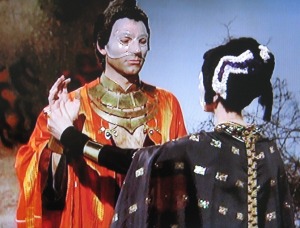Cawdor Kiss
Posted on September 12th, 2011 at 9:00 am by Daniel WeinbrenAmanda Wrigley has contributed another account of an OU play. This Macbeth was made in 1977 as ‘a shortened version concentrating on the main characters and line of action’ as the OU notes put it. Information as to the scenes cut or telescoped was provided in the printed students’ ‘Supplementary Material’. The notes for viewers explain about how the actors sought to achieve particular effects. Highlighting that Macbeth and Lady Macbeth kiss twice, briefly, the ‘television notes’ explain: ‘we tried to convey that they loved each other securely and maturely, not obsessively’. Although there is a large cast for some scenes mostly there was a simple set for this production and often a black background. Perhaps this was due to budgetary constraints, or for artistic reasons or in order to foreground the plot and the words. Unlike the OU’s Oedipus this play foregrounded that it was made for television. When the witches gather round a cauldron there are close ups of images overlaid on the bubbling liquid. This may owe something to Roman Polanski’s 1971 film Macbeth in which the Thane of Cawdor gazes into the witches’ cauldron and sees a montage of images. In the film Francesca Annis played Lady Macbeth. In the OU’s version it was Ann Bell. During a scene between Macbeth, Banquo and King Duncan when Duncan announces that his elder son Malcolm is to be the Prince of Cumberland the camera cuts to him, and then to a petulant-looking Macbeth, who later speaks directly to camera. Towards the end a sword fight is shown in slow motion. The medium was being used to convey the text in ways that the author (c1564-1616) may have found difficult to envisage. Read the rest of this entry »




